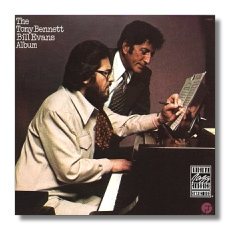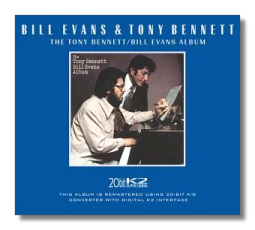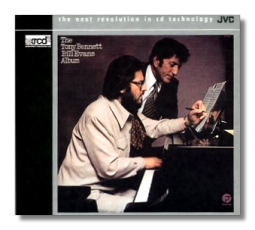
The Internet's Premier Classical Music Source
Related Links
- Latest Reviews
- More Reviews
-
By Composer
-
Collections
DVD & Blu-ray
Books
Concert Reviews
Articles/Interviews
Software
Audio
Search Amazon
Recommended Links
Site News
 CD Review
CD Review
The Tony Bennett/Bill Evans Album

- Albert Hague/Arnold B. Horwitt: Young and Foolish
- Ray Noble: The Touch of Your Lips
- Cy Coleman/Billy Joel/Carolyn Leigh: When in Rome
- Carl Fischer/Frankie Laine: We'll Be Together Again
- Ned Washington/Victor Young: My Foolish Heart
- Bill Evans/Gene Lees: Waltz for Debby
- James Van Heusen/Johnny Burke: But Beautiful
- Henry Mancini/Johnny Mercer: Days of Wine and Roses
- Leonard Bernstein/Betty Comden/Adolph Green: Some Other Time
Tony Bennett, vocals
Bill Evans, piano
Fantasy OJCCD-439-2 (F-9489)
Also released on 20-bit K2 Remastered Version:
Amazon
- UK
- Germany
- Canada
- France
- Japan
- CD Universe
Also released on JVC XRCD2 Version:
Amazon
- UK
- Germany
- Canada
- France
- Japan
- CD Universe
Also released on LP Record:
Amazon
- UK
- Germany
- Canada
- France
- Japan
- JPC
Tony Bennett's career is a bit of an anomaly – a pop/jazz singer who does the classic American standard. He concentrates on the likes of Berlin, Gershwin, Arlen, Duke, Rodgers, Porter, and their descendants, but (with one exception) his big hits have been mostly syrupy junk. This says less about him than about us.
During rock's big eclipse of pop, Columbia records, after about 20 years of steady revenue from Bennett, chose not to re-sign him, and the singer for the first time found himself without a recording contract. Bennett, although missing the income, turned this misfortune into a creative blessing. He could now give his full attention to his core repertoire, without having to throw the record company a bone like "Love Story" or "Little Green Apples." One happy project was for the small Fantasy jazz label – a collaboration with Bill Evans, the best jazz pianist of his generation. They actually made two albums together; this one is the first. Normally, Evans did not accompany singers. Like Tatum, his piano playing was orchestral, in that he was used to supplying most, if not all, of the musical interest. Bennett up to this time wasn't known as a jazz singer, any more than, say, Andy Williams is now.
To this day, it sounds odd to call Bennett a true jazz singer. Certainly he's no flashy melody-bender, like Vaughan or Torme. He approaches jazz through the pop route pioneered by Sinatra, and, I believe, more successfully than Sinatra, who never really left the big band. The style involves mainly a parlando and a delayed attack as well as the occasional displaced melody note. The opening ballad, "Young and Foolish," establishes Bennett as a master of the genre. I don't normally even care for the song, typical of the sentimental goo of the late 40s and early 50s, but Bennett wins me over with superlative phrasing of the lyric and a non-treacly persona. He launches right into the chorus, with Evans supplying complex blocks of harmony and, here and there, an elegant counter-melody. Bennett takes the first phrase at a very slow tempo, and in one breath, at that. He then takes a series of short phrases so that the long phrase becomes more surprising (and breathtaking) when one finally comes around again. Evans's solo mixes piano textures, varying the melody minimally. The object isn't to play a lot of notes, but to play the right one at any given moment.
It's worth going into the persona Bennett creates. A great pop or jazz singer establishes a unique attitude toward his material. Bennett has been concerned with finding one from the beginning of his career. He recognized not only the importance of Sinatra but also simply appropriating Sinatra wouldn't do. If Frank Sinatra became, in Mel Torme's phrase, "the voice of our time," Bennett became an Urban Natural. If I close my eyes, I can picture Bennett in a bar or a restaurant or walking along the street. I do the same for Sinatra, and I picture him fronting a band or in a recording studio – that is, at a remove from the song's scene. Like all classics, you can't really locate Sinatra in a particular milieu. He's urban, but you have no sense of his history – that is, through the voice alone. On the other hand, like Humphrey Bogart entering the screen for the first time, Bennett establishes with his first notes that he has a past. He can touch the sentimental without becoming tarred by it, for his sense of the past, which includes getting around hard times, transforms the sentimental into true sentiment.
Musically, Bennett is about the long, legato line, which makes ballads a natural form for him. Nevertheless, he swings, and I wish he would do more of it. In an up-tempo number like Coleman's "When in Rome" or the recent hit "Steppin' Out," he lightly jabs at the line, all the while keeping the overall arch of the phrase. It's almost as if he provides his own cymbals and brush. He can also move convincingly between the balladeer and the swinger. Ray Noble's "The Touch of Your Lips" begins as a free-form ballad and, before you realize it, becomes a cool finger- snapper.
The high point of the album for me is Leonard Bernstein's "Some Other Time," from his first show, On the Town. I can't think of too many singers diligent enough to seek the song out or with the courage to perform it. Though gorgeous, this number has several land mines for the singer – unusual harmonic shifts and, most obviously, the climactic phrase "Oh well," beginning on the highest note in the song and descending an octave. The snare usually results in either a constricted or falsetto'd "Oh," and there's no place for the singer to hide. Bennett carries it off (despite a slight constriction). This is probably Bennett's straightest performance on the album, for Bernstein, despite dipping into the pop idiom, is really writing something closer to an art song. The pop freedom of the piece is illusion. In fact, it's written in. For the singer, Bernstein scripts a very tight line, and Bennett toes it. The jazz is left to Evans, who in a minute and a half not only builds on Bernstein's already-complex harmonies but also comes up with his own tunes on the changes.
The style of the album is intimate, but don't mistake it for mood music. Each track bears repeated and attentive listening.
Copyright © 1996, Steve Schwartz






















